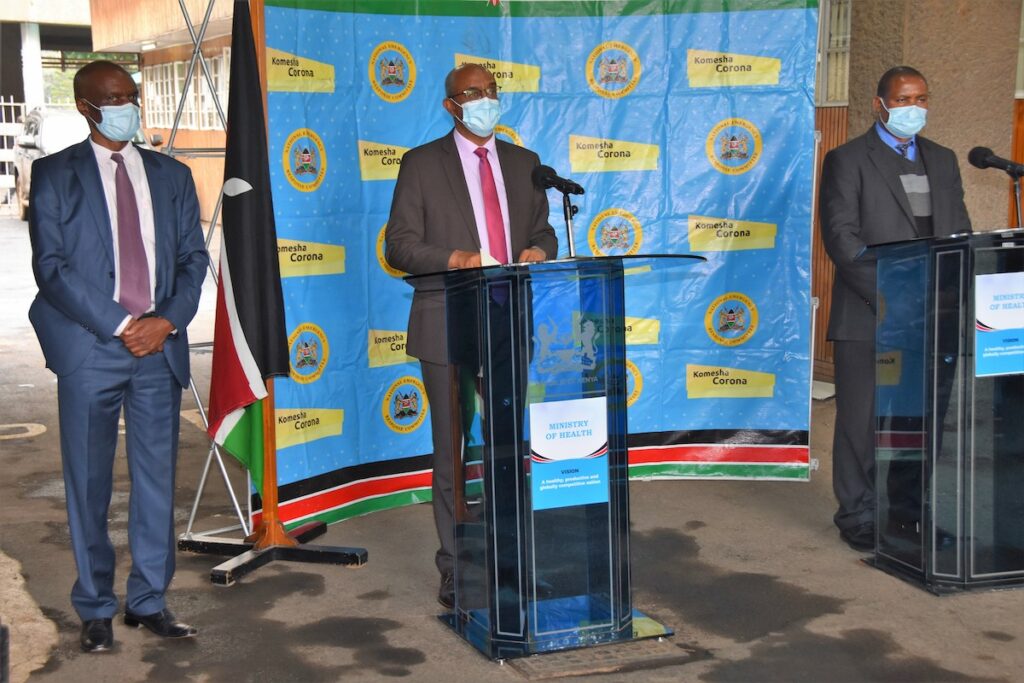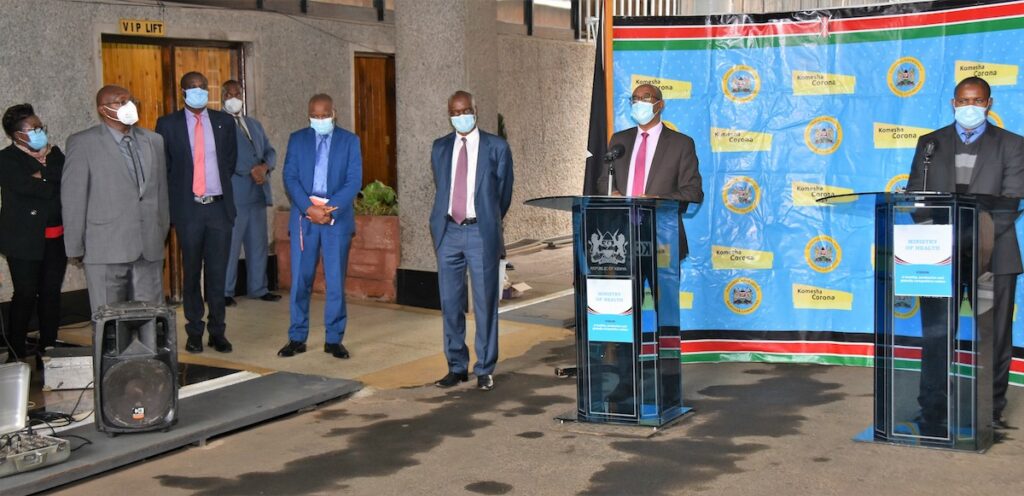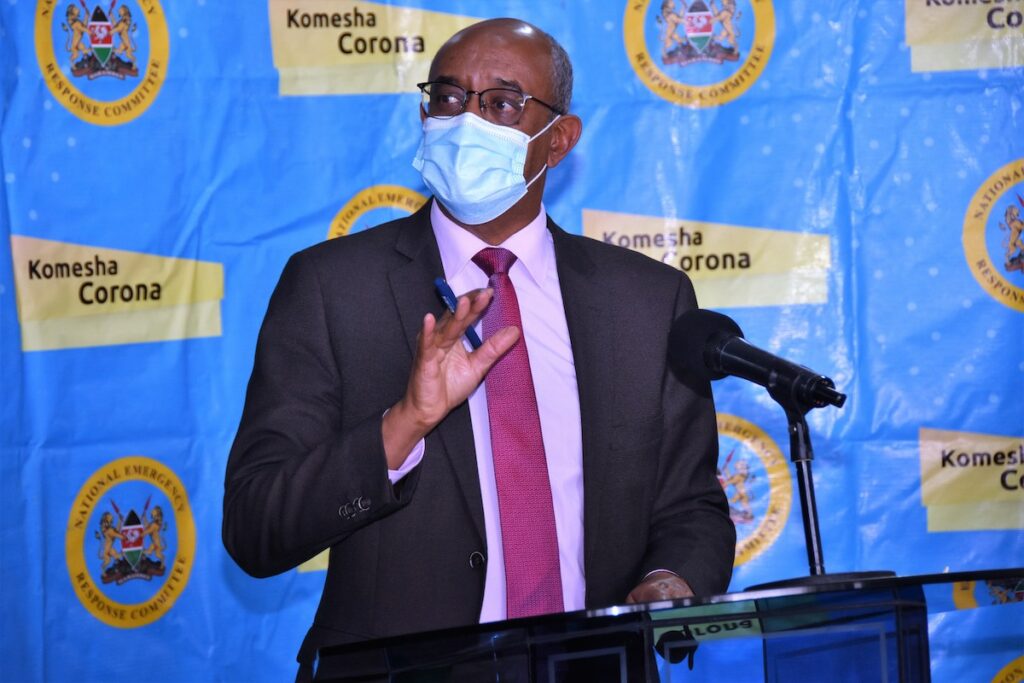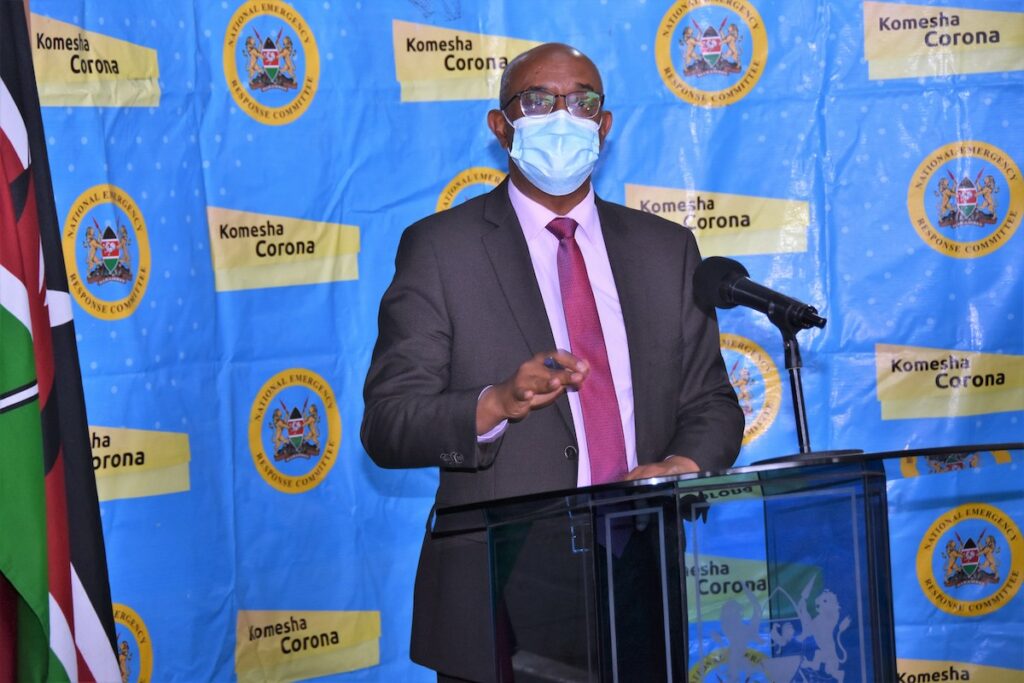PPB accelerates authorization of treatment and diagnostics to combat COVID-19
Nairobi September 7, 2020 – The Pharmacy and Poisons Board has instituted internationally accepted Emergency use/Compassionate use Authorisation (EUCUA procedure), for quick authorisation of treatments and diagnostics to combat the effects of Covid-19 disease.

Through this procedure, the PPB has issued Emergency Use Authorisations (EUAs) for (IVD) for detection of COVID-19, the Chief Administrative Secretary (CAS) for Health Dr. Rashid Aman disclosed today.
He noted that “ensuring a steady supply of quality, safe and efficacious health products and technologies, is a key strategy, in combating COVID-19 pandemic in the country.”
Speaking during the daily Covid-19 media briefing at Afya House today the CAS said quality and compliance of specifications of HPT’s used in the management of COVID 19, such as, alcohol-based hand sanitizers (ABHS), personal protective equipment (PPE’s) such as surgical face masks and medicines is critical in this fight against the pandemic.

“In light of the above, there is need to continuously monitor and ensure quality of products circulating in the market, in order to effectively combat COVID-19 pandemic,” he advised.
In the period between 20th April and 30th June 2020, the Ministry of Health through PPB carried out quality analysis of alcohol-based sanitizers and surgical masks circulating in the Kenyan market. 130 different brands of ABHS in the market were analysed and those failing to meet set standards removed from the market.
The preliminary results from analysis of the first set of 80 samples found that 79 of them which is (98.75%) complied with the KEBS standard on alcohol concentration.
The preliminary results from the analysis of the second set of ABHS found that 13 out of 50 samples which is (26.00%) complied with KEBS standard on alcohol concentration. Some of the failing products were found to contain methanol.

Dr. Aman said the PPB is currently providing technical support to those firms where products fail, to improve their manufacturing processes and standards.
Medicines, medical products and supplies of medical equipment among others collectively referred to as Health Products and Technologies are an integral part of the healthcare system in Kenya.
The regulation of HPTs is carried out by the Pharmacy and Poisons Board which is the National Medicines Regulatory Authority. The PPB is also charged with marketing authorisation approval or product registration permits for medicinal products that are marketed or distributed in the country.
This process entails assessment of applications for issuance of Health products & technologies, including medicines, medical devices and In Vitro Diagnostics (IVDs) to evaluate and monitor their quality, safety, and efficacy or performance. The purpose of market authorization is to protect consumers against effects of unsafe and ineffective products by ensuring that:
a. The availability of the drug is in the public interest
b. The Health products are safe, efficacious and of acceptable quality
c. The production site and manufacturing operations comply with current Good Manufacturing Practices (cGMPs).

When the Covid-19 pandemic struck the country in March this year, one of the major challenges that the Ministry of Health grappled with, was the supply of equipment and health products to deal with this deadly disease. This included, Personal Protective Equipment (PPEs) for health care workers, testing kits and reagents that over the period became scarce due to the global market demand.
The scarcity of some of these commodities forced the government to think of a new strategy, to avert a looming crisis. The National Emergency Response Committee on Covid-19, turned to local manufacturers whom they encouraged to among other things, manufacture PPEs for use in the country.
Without Compromising standards, various local enterprises repurposed their assembly lines and started producing products that complied with the quality of the Kenya Bureau of Standards. Locally manufactured PPE’s which include coveralls, head-covers, safety boots and masks have been approved by the relevant regulatory authorities.
This remarkable response has enabled Kenya to meet its local demand as-well as supply countries in the region. Several local textile companies are now producing PPEs that meet international standards of manufacture.
Currently, the PPB is undertaking market surveillance of PPEs in all counties starting with Western and Nyanza regions to monitor quality and implement regulatory actions. The PPB also carries out studies to monitor previously unreported adverse effects of medicines and medical products after they have been licensed for use. This normal practice by medicine authorities is called pharmacovigilance.
To assure the safety of COVID-19 patients during their course of treatment, the PPB is also conducting countrywide pharmacovigilance of Health Products and Technologies used in the management of COVID-19.
The data obtained in this important retrospective and prospective study will assist the country in linking the outcomes to medications, patients factors such as, comorbidity, probability of getting adverse drug reactions or events among others, during the course of treatment of COVID-19. This data will also contribute greatly to the body of knowledge in the management of the pandemic.
The CAS also noted that the Ministry of Health, recognizes the importance of research in the race to develop novel treatment and preventive remedies for COVID-19, such as drugs and vaccines. In solidarity with all countries in the world and global bodies such as the World Health Organization, the Ministry through the Pharmacy and Poisons Board is responsible for the authorization of clinical trials.
“The PPB has a robust clinical trial review process, undertaken by an expert committee drawn from various relevant fields. The PPB has so far received a total of seven (7) applications related to Covid-19 clinical trials,” he said.
These applications propose the use of different products including convalescent plasma, vaccine, monoclonal antibody, repurposed drugs and radiotherapy.
He said so far, three applications have been reviewed and approved while four are under different review stages. “Approval for the studies come with strict conditions including submission of monthly progress reports, and are also subject to regular monitoring to ensure compliance with legal, regulatory and GCP compliance,” he added.

